Microbiologica - Guías de estudio, Notas de estudios & Resúmenes
¿Buscas las mejores guías de estudio, notas de estudio y resúmenes para Microbiologica? En esta página encontrarás 137 documentos de estudio para Microbiologica.
Página 3 fuera de 137 resultados
Ordenador por
Test Bank For Microbiology for Surgical Technologists - 2nd - 2017 All Chapters
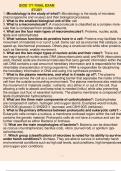
-
BIOD 171 FINAL EXAM STUDY 1. Microbiology is the study of what?: Microbiology is the study of microbes (microorganisms and viruses) and their biological processes. 2. What is the smallest biological unit of life: cell 3. What is a macromolecule?: A macrom
- Examen • 11 páginas • 2023
-
- 12,94 €
- + aprende más y mejor
BIOD 171 FINAL EXAM STUDY 1. Microbiology is the study of what?: Microbiology is the study of microbes (microorganisms and viruses) and their biological processes. 2. What is the smallest biological unit of life: cell 3. What is a macromolecule?: A macromolecule is classified as a complex molecule that is composed from smaller subunits. 4. What are the four main types of macromolecules?: Proteins, nucleic acids, lipids and carbohydrates
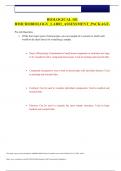
-
BIOLOGICAL 101 BMICROBIOLOGY_LAB03_ASSESSMENT_PACKAGE.
- Examen • 5 páginas • 2024
-
- 12,94 €
- + aprende más y mejor
BIOLOGICAL 101 BMICROBIOLOGY_LAB03_ASSESSMENT_PACKAGE. Pre-Lab Questions 1. Of the four major types of microscopes, give an example of a scenario in which each would be the ideal choice for visualizing a sample. • Stereo (Dissecting): Examination of small macro organisms or structures too large to be visualized with a compound microscope. Used in teaching and research labs. • Compound: Inexpensive way to look at microscopic cells and other features. Used in teaching and r...
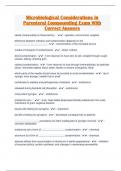
-
Microbiological Considerations in Parenteral Compounding Exam With Correct Answers
- Examen • 4 páginas • 2024
-
- 13,23 €
- + aprende más y mejor
Microbiological Considerations in Parenteral Compounding Exam With Correct Answers Microbiological Considerations in Parenteral Compounding Exam With Correct Answers Microbiological Considerations in Parenteral Compounding Exam With Correct Answers Microbiological Considerations in Parenteral Compounding Exam With Correct Answers Microbiological Considerations in Parenteral Compounding Exam With Correct Answers Microbiological Considerations in Parenteral Compounding Exam With Correct Answers Mi...
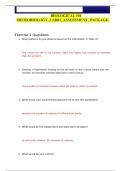
-
BIOLOGICAL 101 MICROBIOLOGY_LAB01_ASSESSMENT_PACKAGE.
- Examen • 15 páginas • 2024
-
- 6,71 €
- + aprende más y mejor
BIOLOGICAL 101 MICROBIOLOGY_LAB01_ASSESSMENT_PACKAGE. Exercise 1 Questions 1. What patterns do you observe based on the information in Table 4? The closer the pH is too neutral (7pH) the higher the number of colonies that are present. 2. Develop a hypothesis relating to the pH level of the culture media and the number of microbial colonies observed in each culture. The number of colonies increase when pH scale is closer to neutral. 3. What would your experim...
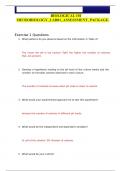
-
BIOLOGICAL 101 MICROBIOLOGY_LAB01_ASSESSMENT_PACKAGE.
- Examen • 15 páginas • 2024
-
- 6,71 €
- + aprende más y mejor
BIOLOGICAL 101 MICROBIOLOGY_LAB01_ASSESSMENT_PACKAGE. Exercise 1 Questions 1. What patterns do you observe based on the information in Table 4? The closer the pH is too neutral (7pH) the higher the number of colonies that are present. 2. Develop a hypothesis relating to the pH level of the culture media and the number of microbial colonies observed in each culture. The number of colonies increase when pH scale is closer to neutral. 3. What would your experim...
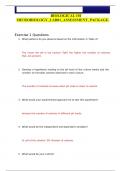
-
BIOLOGICAL 101 MICROBIOLOGY_LAB01_ASSESSMENT_PACKAGE.
- Examen • 15 páginas • 2024
-
- 6,71 €
- + aprende más y mejor
BIOLOGICAL 101 MICROBIOLOGY_LAB01_ASSESSMENT_PACKAGE. Exercise 1 Questions 1. What patterns do you observe based on the information in Table 4? The closer the pH is too neutral (7pH) the higher the number of colonies that are present. 2. Develop a hypothesis relating to the pH level of the culture media and the number of microbial colonies observed in each culture. The number of colonies increase when pH scale is closer to neutral. 3. What would your experim...
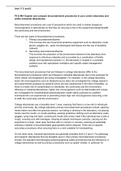

-
Unit 17 C & D Microbiology and Microbiological Techniques- BTEC Extended diploma applied medical science
- Resumen • 21 páginas • 2021
-
Disponible en paquete
-
- 15,48 €
- 30x vendido
- + aprende más y mejor
Achieved distinction without feedback. Covers pass, merit and distinction, written at high quality.
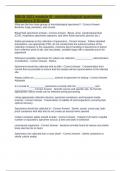
-
MDLB 1521 module B - microbiological specimens Questions || Graded
- Examen • 7 páginas • 2024
-
Disponible en paquete
-
- 9,58 €
- + aprende más y mejor
What are the four main groups of microbiological specimens? - Correct Answer Bacteria, fungi, parasites, and viruses Blood fluid specimens include - Correct Answer Blood, urine, cerebrospinal fluid (CSF), respiratory specimens (sputum), and other fluids (synovial, pleural, etc.) Safety procedures in the collection of specimens - Correct Answer Follow standard precautions, use appropriate PPE, do not contaminate the external surface of the collection container or the requisition, mini...
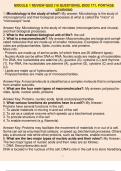
-
Module 1 Review Quiz (16 questions), BIOD 171, Portage Learning 1. Microbiology is the study of what?: My answer: Microbiology is the study of microorganisms and their biological processes at what is called the "micro" or "microscopic" level.
- Examen • 4 páginas • 2023
-
- 11,02 €
- + aprende más y mejor
Module 1 Review Quiz (16 questions), BIOD 171, Portage Learning 1. Microbiology is the study of what?: My answer: Microbiology is the study of microorganisms and their biological processes at what is called the "micro" or "microscopic" level. Answer Key: Microbiology is the study of microbes (microorganisms and viruses) and their biological processes. 2. What is the smallest biological unit of life?: the cell 3. What is a macromolecule?: My answer: Macromolecules are large and complic...

Ese resumen que acabas de comprar ha hecho muy feliz a alguien. ¿También te pagan semanalmente? ¡Vende tus documentos de estudio en Stuvia! Descubre todo sobre cómo ganar en Stuvia



